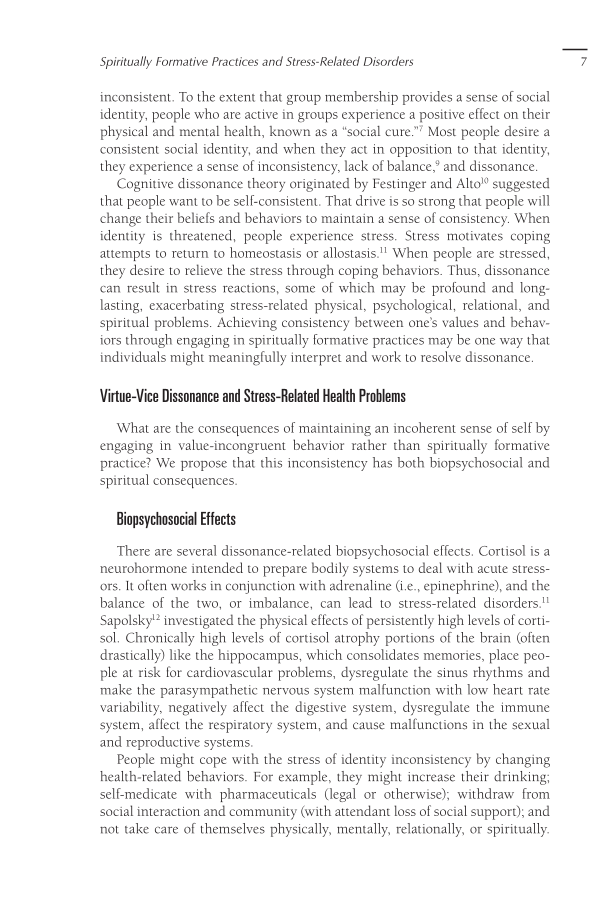Spiritually Formative Practices and Stress-Related Disorders 7 inconsistent. To the extent that group membership provides a sense of social identity, people who are active in groups experience a positive effect on their physical and mental health, known as a “social cure.”7 Most people desire a consistent social identity, and when they act in opposition to that identity, they experience a sense of inconsistency, lack of balance,9 and dissonance. Cognitive dissonance theory originated by Festinger and Alto10 suggested that people want to be self-consistent. That drive is so strong that people will change their beliefs and behaviors to maintain a sense of consistency. When identity is threatened, people experience stress. Stress motivates coping attempts to return to homeostasis or allostasis.11 When people are stressed, they desire to relieve the stress through coping behaviors. Thus, dissonance can result in stress reactions, some of which may be profound and long- lasting, exacerbating stress-related physical, psychological, relational, and spiritual problems. Achieving consistency between one’s values and behav- iors through engaging in spiritually formative practices may be one way that individuals might meaningfully interpret and work to resolve dissonance. Virtue-Vice Dissonance and Stress-Related Health Problems What are the consequences of maintaining an incoherent sense of self by engaging in value-incongruent behavior rather than spiritually formative practice? We propose that this inconsistency has both biopsychosocial and spiritual consequences. Biopsychosocial Effects There are several dissonance-related biopsychosocial effects. Cortisol is a neurohormone intended to prepare bodily systems to deal with acute stress- ors. It often works in conjunction with adrenaline (i.e., epinephrine), and the balance of the two, or imbalance, can lead to stress-related disorders.11 Sapolsky12 investigated the physical effects of persistently high levels of corti- sol. Chronically high levels of cortisol atrophy portions of the brain (often drastically) like the hippocampus, which consolidates memories, place peo- ple at risk for cardiovascular problems, dysregulate the sinus rhythms and make the parasympathetic nervous system malfunction with low heart rate variability, negatively affect the digestive system, dysregulate the immune system, affect the respiratory system, and cause malfunctions in the sexual and reproductive systems. People might cope with the stress of identity inconsistency by changing health-related behaviors. For example, they might increase their drinking self-medicate with pharmaceuticals (legal or otherwise) withdraw from social interaction and community (with attendant loss of social support) and not take care of themselves physically, mentally, relationally, or spiritually.
Document Details My Account Print multiple pages
Print
You have printed 0 times in the last 24 hours.
Your print count will reset on at .
You may print 0 more time(s) before then.
You may print a maximum of 0 pages at a time.










































































































































































































































































